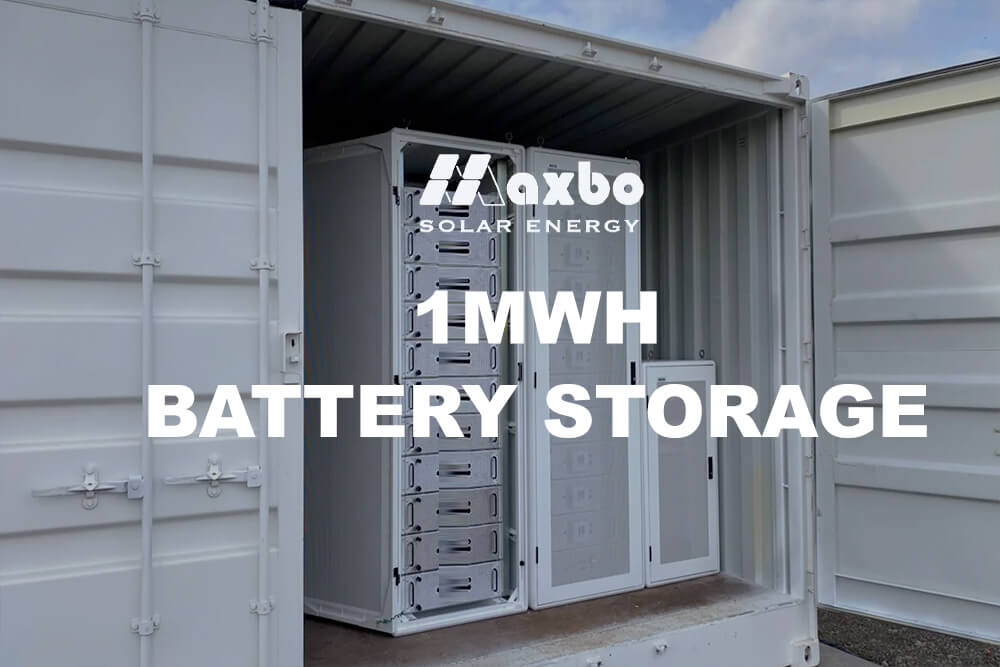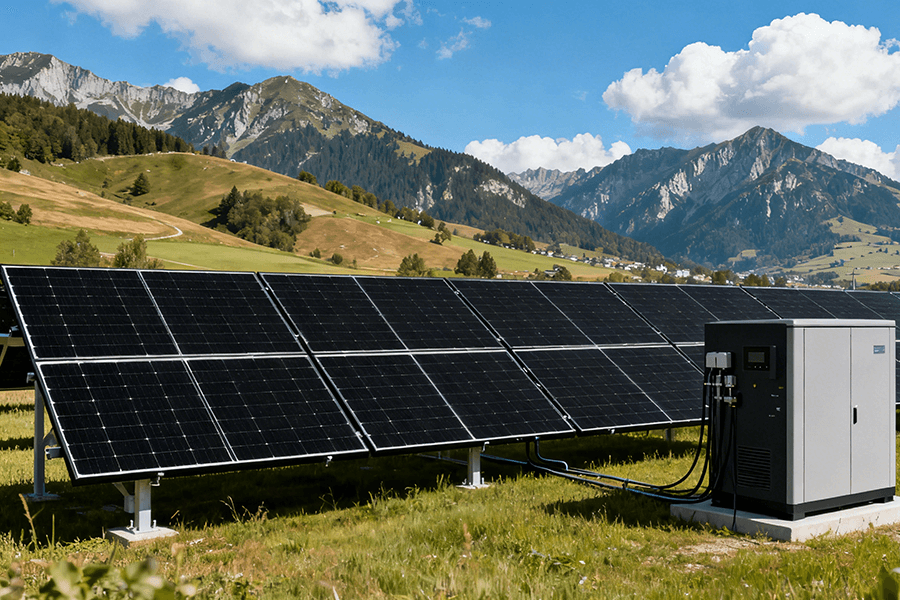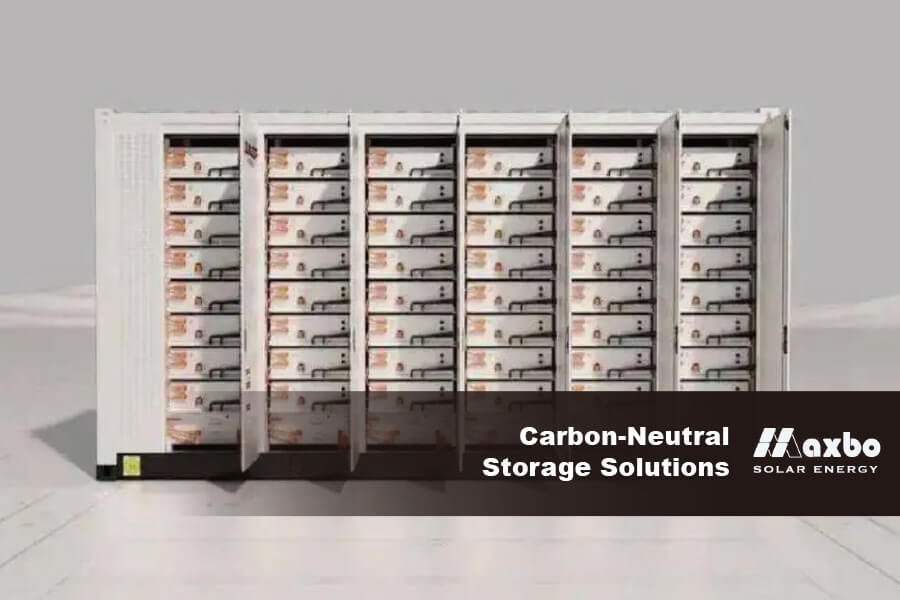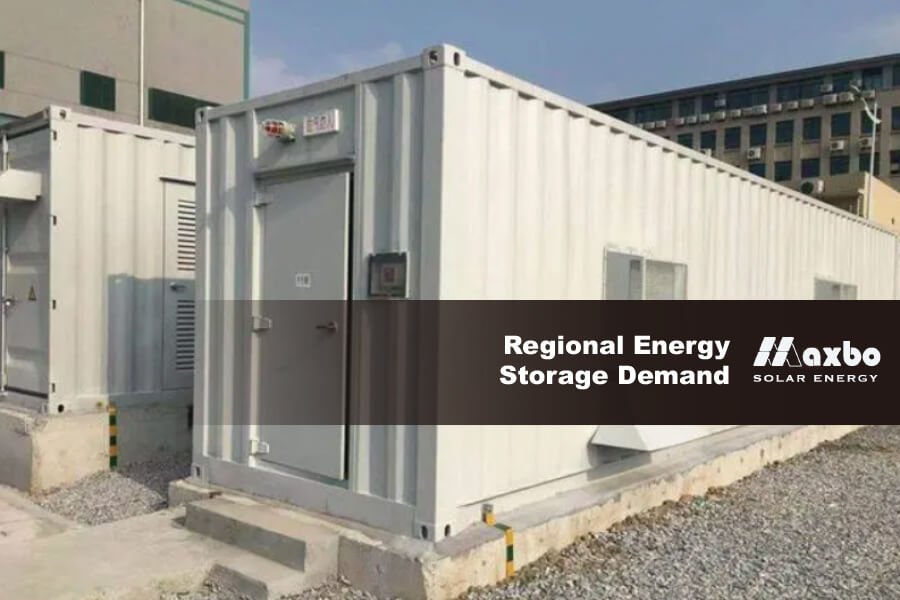Unlock the Power of Your Energy with 1MWh Battery Storage: Save Up to 40% with Our Top Solutions
In the era of renewable energy and rising electricity costs, energy storage has become an essential component for both residential and commercial energy systems. A 1MWh (megawatt-hour) battery storage solution is a powerful tool that can enhance energy reliability, reduce costs, and support a sustainable future. At Maxbo Solar, we understand the importance of having a robust and efficient energy storage system. In this article, we’ll explore the design and calculation of 1MWh battery storage systems, provide a budget range for different options, and guide you through selecting the ideal solution for your needs.

Table of Contents
ToggleUnderstanding 1MWh Battery Storage Systems
A 1MWh battery storage system is designed to store and discharge up to one megawatt-hour of energy. This capacity is suitable for medium to large-scale applications, including commercial buildings, industrial sites, and large residential setups. Let’s break down the key components and design considerations of a 1MWh battery storage system.
1. Key Components of a 1MWh Battery Storage System
- Battery Modules:
- Design and Function: Battery modules are the core of the storage system. They store electrical energy in chemical form and release it when needed. For a 1MWh system, you typically need multiple modules working together.
- Types: Lithium-ion batteries are the most common due to their high energy density, long cycle life, and efficiency. Lead-acid batteries are also an option but are less common for larger systems due to their lower energy density and shorter lifespan.
- Reference: Energy Storage Association: Battery Technologies
- Battery Management System (BMS):
- Design and Function: The BMS monitors and manages the performance of the battery modules. It ensures the batteries are operating within safe limits, balancing charge and discharge cycles, and preventing overcharging or deep discharging.
- Features: Advanced BMS systems include thermal management, state-of-charge (SOC) monitoring, and diagnostic capabilities.
- Reference: National Renewable Energy Laboratory: Battery Management Systems
- Inverter/Converter:
- Design and Function: The inverter/converter converts the DC (direct current) electricity stored in the batteries into AC (alternating current) electricity used by most electrical devices. It also manages the power flow between the batteries and the grid or load.
- Types: Inverters can be string inverters, central inverters, or hybrid inverters depending on the system design and requirements.
- Reference: Solar Energy Industries Association: Inverters
- Energy Management System (EMS):
- Design and Function: The EMS optimizes the use of stored energy based on real-time data and user preferences. It can automate energy storage, discharge, and grid interaction to maximize efficiency and savings.
- Features: Includes load forecasting, energy scheduling, and integration with renewable energy sources.
- Reference: Green Tech Media: Energy Management Systems
- Enclosure and Cooling System:
- Design and Function: The enclosure houses the battery modules and other components, protecting them from environmental factors. The cooling system prevents overheating, which is crucial for maintaining performance and longevity.
- Features: Typically includes ventilation or active cooling systems for large-scale installations.
- Reference: IEEE Spectrum: Battery Storage Systems
2. Design and Calculation of a 1MWh Battery Storage System
Designing a 1MWh battery storage system involves several key calculations and considerations:
- Energy Capacity:
- Calculation: To achieve a 1MWh capacity, you need to determine the number of battery modules required. For example, if each module has a capacity of 100 kWh, you would need 10 modules to reach 1MWh.
- Considerations: Factor in the depth of discharge (DoD) and efficiency of the batteries. For lithium-ion batteries, DoD is typically around 80-90%.
- Reference: Energy Storage Association: Understanding Energy Capacity
- Power Rating:
- Calculation: Determine the power rating required based on your peak load demands. If you need to discharge 500 kW at peak, ensure the inverter and battery modules can handle this power requirement.
- Considerations: The power rating should match your load requirements and the capacity of the inverter.
- Reference: Clean Energy Reviews: Power Rating Calculations
- Sizing the Inverter:
- Calculation: The inverter should be sized to handle the maximum power output of the battery system. For a 1MWh system with a peak load of 500 kW, a suitable inverter would be rated at or above 500 kW.
- Considerations: Choose an inverter with a higher power rating to account for efficiency losses and future expansion.
- Reference: Solar Power World: Inverter Sizing Guide
- Space and Cooling Requirements:
- Calculation: Estimate the physical space needed for the battery modules, BMS, inverter, and cooling system. Ensure adequate ventilation and cooling to maintain optimal operating conditions.
- Considerations: Plan for installation space and access for maintenance.
- Reference: Battery University: Space and Cooling
- Safety and Compliance:
- Considerations: Ensure the system complies with local regulations and safety standards. This includes fire safety, electrical codes, and environmental regulations.
- Reference: International Electrotechnical Commission: Battery Storage Safety
3. Budget Range for 1MWh Battery Storage Systems
The cost of a 1MWh battery storage system varies based on the components and installation requirements. Here’s a rough budget range for different options:
- Basic Lithium-Ion System: $500,000 – $700,000
- Components: Standard lithium-ion batteries, basic BMS, and inverter.
- Features: Suitable for general applications with standard efficiency and performance.
- Reference: Energy Storage Association: Cost Factors
- Advanced Lithium-Ion System: $700,000 – $1,000,000
- Components: High-efficiency lithium-ion batteries, advanced BMS, and high-performance inverter.
- Features: Enhanced efficiency, longer lifespan, and additional features such as advanced monitoring and cooling systems.
- Reference: BloombergNEF: Advanced Battery Storage Costs
- Custom Solution: $1,000,000 – $1,500,000
- Components: Tailored battery modules, bespoke BMS and EMS, and custom enclosure and cooling solutions.
- Features: Fully customized to specific requirements, including high-performance and integration with other systems.
- Reference: Greentech Media: Custom Battery Solutions
4. How to Choose the Right 1MWh Battery Storage System
Selecting the right battery storage system requires careful consideration of your needs and circumstances. Here’s a guide to help you choose:
- Assess Your Energy Needs:
- Determine your peak power demands and total energy consumption. This will help you decide on the capacity and power rating of the system.
- Reference: U.S. Department of Energy: Energy Needs Assessment
- Consider the Type of Battery:
- Lithium-ion batteries are preferred for their efficiency and lifespan, but lead-acid batteries can be a more affordable option for some applications.
- Reference: Clean Energy Reviews: Battery Types
- Evaluate Inverter and BMS Options:
- Choose an inverter and BMS that match your power and energy requirements. Look for features that enhance efficiency and safety.
- Reference: Energy Storage News: Choosing Inverters
- Account for Space and Cooling:
- Ensure you have adequate space for installation and cooling. Consider future expansion and ease of maintenance.
- Reference: Battery University: Installation Space
- Set a Budget:
- Align your budget with the type of system you need. Remember to factor in installation and maintenance costs.
- Reference: Solar Power World: Budgeting for Battery Storage
- Consult with Experts:
- Engage with a professional to design and customize your system. They can provide valuable insights and ensure the system meets all requirements.
- Reference: National Renewable Energy Laboratory: Consulting Services
Maxbo Solar’s 1MWh Battery Storage Solutions
At Maxbo Solar, we offer a range of 1MWh battery storage solutions designed to meet various needs and budgets. Our systems are customizable, allowing you to select components and configurations that best suit your requirements.
Custom Battery Storage Solutions
We provide tailored 1MWh battery storage systems designed to meet your specific energy needs. Whether you require a basic setup or a high-performance system, we can help you create the perfect solution. Explore our custom energy storage systems to get started.
Pre-configured Systems
For those who prefer a ready-to-install solution, we offer pre-configured 1MWh battery storage systems that are optimized for various applications. Visit our services page to learn more about our offerings and find the ideal system for your needs.
Conclusion
Investing in a 1MWh battery storage system is a strategic decision that can enhance your energy reliability and efficiency. By understanding the design, calculations, and budget options, you can make an informed choice that aligns with your energy goals.
At Maxbo Solar, we are dedicated to providing high-quality battery storage solutions that meet your specific needs. Whether you choose a custom solution or a pre-configured system, we have the expertise and products to ensure your energy storage system performs optimally. Explore our custom and pre-configured solutions today and take the next step towards a more sustainable and cost-effective energy future.
For personalized assistance or additional information, feel free to reach out to us through our website. Let’s work together to power your energy future!
References:
- Energy Storage Association: Battery Technologies
- National Renewable Energy Laboratory: Battery Management Systems
- Solar Energy Industries Association: Inverters
- Green Tech Media: Energy Management Systems
- IEEE Spectrum: Battery Storage Systems
- Energy Storage Association: Understanding Energy Capacity
- Clean Energy Reviews: Power Rating Calculations
- Solar Power World: Inverter Sizing Guide
- Battery University: Space and Cooling
- International Electrotechnical Commission: Battery Storage Safety
- Energy Storage Association: Cost Factors
- BloombergNEF: Advanced Battery Storage Costs
- Greentech Media: Custom Battery Solutions
- U.S. Department of Energy: Energy Needs Assessment
- Clean Energy Reviews: Battery Types
- Energy Storage News: Choosing Inverters
- Battery University: Installation Space
- Solar Power World: Budgeting for Battery Storage
- National Renewable Energy Laboratory: Consulting Services
Related Solutions
Related Blogs
EU Cold Chain BESS Container: Stop €1.2B Food Waste & Slash Emissions for EU Cold Chains
行政2025-12-18T16:23:32+08:00December 17th, 2025|Categories: Design, News|
Grid Virtual Inertia BESS Container Europe: Stabilizing High-Renewable Grids Post-Coal Phase-Out
行政2025-12-18T16:11:18+08:00December 17th, 2025|Categories: Design, News|
Let’s Make Things Happen
Add notice about your Privacy Policy here.
Let’s Make Things Happen
”The Maxbo team of sales consultants will continue to enrich our own expertise and experience to empower the development of sustainable energy with rigor.“
Maxbo CEO
You will need to provide: 1. the amount of electricity used. 2. the type and power of the load. 3. the electricity consumption habits (daytime/nighttime consumption). 4. the need to store electricity. 5. the need to feed electricity to the mains. 6. drawings or address of the installation site. 7. other special requirements
We can provide you with a quotation, a specification for all products, a circuit connection diagram and a diagram of the installation and placement of the PV panels. Any other requirements and adjustments needed can be discussed with our team.
We can meet the needs of most scenarios, whether your application is for domestic, commercial and industrial use, in remote areas, or for grid-level energy storage, we have experienced colleagues to design and deliver the right solution.
Add notice about your Privacy Policy here.
How much solar power do I need?
Most homes need 5–12kW, depending on your energy use and location.
Off-grid vs. grid-tied — what’s the difference?
Off-grid works without the utility grid; grid-tied lets you sell extra power back.
Do I need permits?
Usually yes — check local rules or ask us for guidance.
How long does a battery last?
Depends on size and load. A 5kWh battery can power a fridge for about 40 hours.
Can I upgrade my system later?
Yes, our systems are modular and easy to expand.
Does Maxbo offer installation?
We ship globally and connect customers with trusted local installers.






